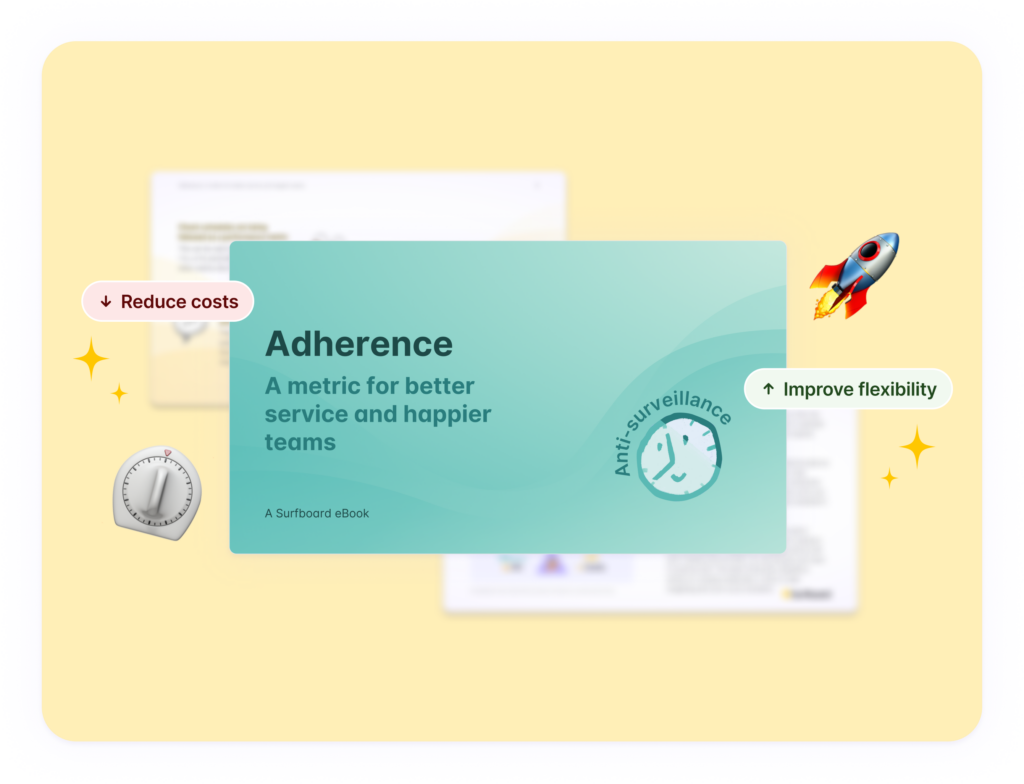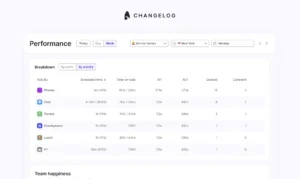
What is schedule adherence in a call centre?

Call centres often face the challenge of managing customer demands, particularly during peak periods such as weekends, seasonal holidays, and promotional events. These instances can lead to an overwhelming influx of customer support queries, significantly disrupting your targets and schedules.
This is where schedule adherence matters.
By implementing call centre schedule adherence, you can uphold service standards, reduce wait times, and manage your customer inquiries efficiently.
Learn about the intricacies of schedule adherence, including how you calculate it and the best practices for ensuring optimal performance.
What does adherence mean?
Schedule adherence is an efficiency metric which measures how well your agents are following their schedules. Call centre adherence is crucial for assessing agent performance and ensuring that every member of your team is pulling their weight.
This metric isn’t just about clocking in and out on time, though. It involves ensuring your team sticks to their breaks and other planned activities without a hitch.
Why does this matter?
Because it’s a direct reflection of your agents’ punctuality, performance, and, ultimately, their responsibility and contributions within your team.
It’s crucial, however, to recognise that deviations from the schedule aren’t always a red flag. Sometimes, these instances highlight your team’s commitment to quality customer service. For example, when agents extend their calls past scheduled breaks to resolve customer issues, they’re not just showing dedication; they’re prioritising customer satisfaction over rigid scheduling—forcing conversations to a close for the sake of adherence compromises service quality.
Nevertheless, consistently prolonged calls might signal something deeper, like an overwhelming workload. This is where you step in, to uncover and address the root causes. Your role is critical in striking the balance between maintaining schedule discipline and fostering an environment where exceptional customer service thrives and you can use schedule adherence for this.
How to calculate schedule adherence?
Call centre adherence is calculated as a percentage. You divide an agent’s actual time where they’re available to handle calls by their total scheduled working time. Then, you multiply this number by 100 to get a final adherence percentage.
So the schedule adherence formula is:
Schedule adherence = (actual time worked / total time scheduled) x 100.
Let’s look at an example. Say one of your agents has the following schedule:
| Time | Activity |
|---|---|
| 9:00 – 12:00 | Phones |
| 12:00 – 13:00 | Lunch break |
| 13:00 – 15:00 | Phones |
| 15:00 – 15:30 | Afternoon break |
| 15:30 – 17:00 | Phones |
This has them scheduled to work for 390 minutes total.
But they log in a little late, take a long lunch, and start their break earlier than scheduled, so their actual working time looks like this:
| Time | Activity |
|---|---|
| 9:25 – 12:00 | Phones |
| 12:00 – 13:15 | Lunch break |
| 13:15 – 14:50 | Phones |
| 14:50 – 16:30 | Afternoon break |
| 16:30 – 17:00 | Phones |
With these schedule deviations, they end up working for 340 minutes total.
Using the formula, their schedule adherence is:
(340 minutes / 390 minutes) x 100 = 87%.
In most cases, your agents aren’t expected to hit a 100%, which is often unrealistic. To factor in login/logout times, break and lunch schedules, coaching or meeting times, and more, companies often set target percentages at around 95% or 97%.
Adherence standards
When considering maintaining good adherence, adherence standards are your bread and butter. They outline the expectations for your team members, focusing on their presence, punctuality, and alignment with work schedules. Without them, distinguishing between compliance and shortfall in your team’s performance becomes a guessing game.
These call centre adherence standards are:
- Scheduled time: This is the total time your agents are expected to be working, encompassing call handling, breaks, meetings, training, and any other assigned tasks.
- Available time: This tracks the actual time your agents available handle calls or perform scheduled activities, minus the breaks, meetings, and non-call related tasks.
- Idle time: These are moments when an agent isn’t actively engaged in call handling or scheduled tasks, often due to low call volume or technical glitches.
- Absence or unavailability: Any period your agents are off the grid due to vacation, leave, or inability to perform their scheduled duties.
- Deviations or off-schedule activities: These are instances where an agent steps off their planned schedule for valid reasons such as extended calls, customer assistance, or unexpected situations requiring immediate attention.
These guidelines not only structure your team’s workflow, they also ensure that every member contributes effectively to the overarching goal of good customer service.
Reasons to track adherence in call centres
Agents who deviate from their schedules too much put your customer service quality at risk. Fewer agents handling calls means longer waiting times for customers, lowering your customer satisfaction.
Additionally, the agents who are on call will have to work harder than they should. They’ll be more stressed, and you don’t want them to carry this energy into customer interactions- this could also jeopardise the quality of your customer service.
Besides reducing this risk, tracking adherence comes with some serious benefits to your call centre:
Promoting workplace fairness
Tracking call centre schedule adherence promotes workplace fairness by ensuring consistent expectations and equal treatment among your agents. Here’s how it achieves that:
- By tracking adherence, you establish clear and consistent standards across the board. Everyone is accountable for following their assigned schedules, regardless of their position or tenure.
- Adherence tracking creates transparency, making your agents aware that their schedule adherence is being monitored.
- It becomes easier to identify imbalances or instances where certain agents may be consistently overloaded with work, while others have lighter schedules.
Monitoring ensures that policies are applied uniformly, whether it’s regarding break times, time-off requests, or adherence to shift schedules. This avoids any perception of bias or unfairness in policy enforcement.
Implementing shift management software will help automate your scheduling process, eliminating potential human errors and biases that may result in unfair scheduling.
Improving schedules
Adherence tracking helps you analyse historical data to identify call volume patterns, peak hours, and busy periods. By understanding these trends, you can accurately forecast future call volumes and anticipate your staffing needs.
Adherence tracking gives you real-time visibility into agent availability. You can monitor adherence rates throughout the day—and immediately adjust when deviations occur. Adjustments could involve reassigning breaks, staggering lunch periods, or aligning agent shifts with peak call volumes.
Boosting productivity and efficiency
Adherence tracking helps your agents prioritise tasks based on scheduled activities. Agents can allocate their time effectively by prioritising call handling during peak periods, attending meetings, or taking part in training sessions. This ensures that essential tasks are completed on time, contributing to overall efficiency.
Adherence data serves as a key performance metric for your agents. By providing visibility into adherence rates, you can assess individual agents’ performance, identify areas for improvement, and provide targeted coaching and training to enhance productivity and adherence.
How to improve adherence in a call centre
Tracking agents
By tracking your agent’s status, you’re able to see who is switching between available and unavailable states during their scheduled shifts. By monitoring and addressing this behaviour, you minimise disruptions and ensure your team remains consistently available to handle incoming calls.
When tracking your agents, here’s a few ways to get the best results:
- Identify KPIs which align with your call centre’s objectives. These KPIs will serve as benchmarks for tracking agents and measuring their schedule adherence.
- Develop accurate forecasting models to schedule the right number of agents during peak and non-peak periods. This ensures you’ll always have enough staff to cover a workload, while minimising resource waste due to overstaffing.
- Set up regular training and coaching sessions to help agents improve their skills and knowledge, enabling them to handle calls more efficiently.
Surfboard WFM provides a deeper unique approach to adherence with their unique metric, time-on-task. Combining adherence with productivity, managers are able to better understand how agents are working in real-time.
Setting your targets
To ensure you’re getting the best out of adherence tracking, you need to set targets for what you expect adherence to be. 100% isn’t a realistic expectation; taking into account different sources of interference like technical issues as well as comfort breaks, setting a goal of around 85-95% will motivate your team to stay on track.
Additionally, the goal might vary from channel to channel, depending on which work best for you. Different request types might need more attention than others, and your target adherence scores should reflect this. You don’t want agents to prioritise hitting an unrealistic adherence target above delivering quality customer service.
Clearly communicating your target across your team ensures that they’ll be motivated to stay on track, and have visibility into their own contributions to reach this goal.
Incentivising adherence
Establishing a reward system based on adherence performance can incentivise your agents to adhere to their schedules. You should recognise and reward those who consistently meet or exceed adherence targets. This recognition can include bonuses, extra time off, or other incentives that motivate your agents to prioritise schedule adherence, while fostering a positive work environment.
When developing a reward system, here’s a few things you should keep in mind:
- Ensure that the rewards offered are directly tied to schedule adherence—the better the adherence, the bigger the reward. You might consider implementing a tiered structure where your agents can earn different levels of rewards based on their adherence performance.
- Include team-based rewards to foster collaboration and encourage peer support. Team rewards promote a sense of camaraderie and healthy competition among agents, further motivating them to adhere to schedules without cultivating a toxic environment.
- Conduct surveys or hold focus groups to gather feedback on rewards, challenges in adhering to schedules, and suggestions for improving the reward system.
Implementing workforce management software
You should utilise workforce management (WFM) tools to optimise scheduling and adherence tracking. These tools help you forecast call volumes, plan shifts, and manage breaks more efficiently. They provide you with real-time visibility into adherence data, enabling you to make informed decisions and adjustments to ensure optimal staffing levels and schedule adherence.
Surfboard’s user-friendly interface qualifies you to rest your search for optimal customer service scheduling software.
Here’s what Surfboard can do for you:
- Forecasting: accurately forecast call inflows and plan staffing requirements based on historical data—no more guesswork or overstaffing.
- Reporting: track and report agent metrics like performance, adherence, and shrinkage, to give you a clear view of your team’s operation.
- Scheduling: simplify activity scheduling and delegation, allowing you to assign tasks and responsibilities to your agents easily, and generate schedules at the click of a button.
- Integrations: seamlessly integrate with your existing systems, eliminating compatibility issues and ensuring a smooth transition.
- Time-zone management: enjoy comprehensive timezone management features, making it a breeze to coordinate schedules and optimise global operations as your business expands.
Take a tour of Surfboard to see how you can start using WFM software.
Wrapping up
Schedule adherence plays a crucial role in the smooth functioning of a call centre. By ensuring your agents adhere to their scheduled shifts and breaks, your call centre can maintain service level agreements and deliver high-quality customer service. Additionally, understanding the best practices for call centre scheduling ensures you’ll set yourself up for success.
Through tracking adherence metrics and analysing the data, you can identify areas of improvement and make necessary adjustments to optimise their workforce management.
Surfboard’s user-friendly interface and advanced analytics capabilities can empower your call centres to nail scheduling and enhance overall operational efficiency, getting the best from your agents and giving the best to your customers.
Book a demo today and experience the benefits of accurate schedule adherence in your call centre.
Book a demo
FAQs
How can I improve adherence in a call centre?
To enhance schedule adherence in a call centre, you can implement strategies such as accurate forecasting, proper agent training, real-time monitoring, and implementing incentives for adherence.
Why is schedule adherence important in call centres?
Schedule adherence is crucial in call centres because it ensures that surfers can handle customer inquiries promptly, minimising wait times and improving overall customer satisfaction.
What is the difference between schedule adherence and conformance?
Schedule adherence focuses on how closely agents stick to their specific scheduled tasks and timings, including breaks and log-in times. Schedule conformance, however, measures the total amount of work completed by an agent against the total scheduled work time, regardless of the exact times work was performed. Adherence emphasises precision in following a schedule, while conformance emphasises overall productivity.
What is the adherence goal for a call centre?
The adherence goal is the target adherence percentage you want your agents to hit to maximise customer service quality. It’s often unrealistic to expect 100% adherence to schedules, with a lot of call centres setting their adherence goals at 95% or 97%—this will vary depending on your needs.
Download our adherence eBook




